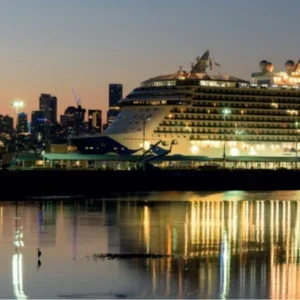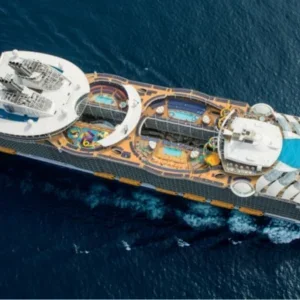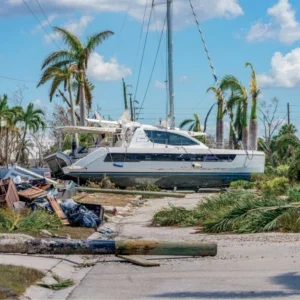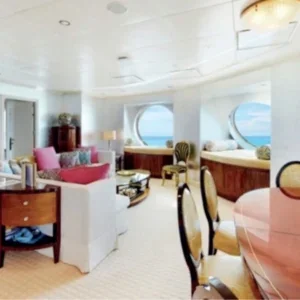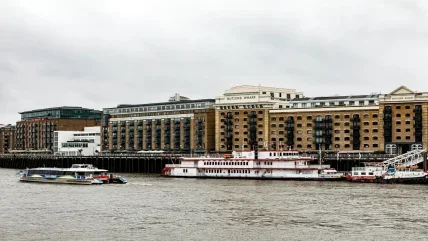
Many things are known about Andy Harmer. He is an experienced and well-respected name, not just in maritime affairs, but in the wider travel industry. As UK and Ireland director at the industry body CLIA, he is also responsible for overseeing domestic cruising in the UK, providing information to and liaising with operators, trade associations and government ministers. Ultimately, Harmer’s calling is safeguarding UK cruising from harm and enabling it to flourish through advocacy and trade relations.
What is not widely known is that in his youth Harmer very nearly became a television actor. Based in Hong Kong on his year abroad, he had the opportunity to act in a one-off drama programme for an English television network. He enjoyed the experience but was due to fly to North America soon after and thought nothing of it. A few days before departure the producer called Harmer, offering him a regular slot on a TV drama. “I’ll never know whether that was something I could have pursued further,” he says with a smile.
It’s a fitting omission. Afterall, for the travel sector, Covid-19 has delivered a series of twists and turns that have much in common with a run of the mill soap opera. Now, after successive lockdowns left cruise operators losing money and trapped in a government imposed limbo, a more positive narrative is emerging.
The cruising reprisal
On 20 May 2021, three days after the UK government gave the green light for domestic cruising, the MSC Virtuosa set sail from Southampton. The ship departed for a four-day round trip via the Isle of Portland in Dorset with 1,000 excitable passengers. After 14-months of inactivity, cruising returned to domestic waters.
“When those ships arrived, it was a moment many of us will never forget,” Harmer says. “I think the media reflected that in the coverage that they gave us. We knew full well that this was a great opportunity for holidaymakers because international travel hasn’t been particularly easy for UK residents. It was an opportunity to take a great holiday, but one close to home.”
For Harmer, the revival was a fitting reward after months spent communicating with government officials to establish a cogent set of protocols to ensure the safety of passengers and staff on board UK vessels.
Long before that he was liaising with the former maritime minister Kelly Tolhurst – who has since been replaced by Robert Courts – to safeguard the interests of UK cruising at a time in which land-based travel and tourism had stalled. The reprisal of domestic cruising is, as Harmer says, a vindication of all that hard work.
“As we have started to see ships arriving in the UK and taking on UK guests, those people have had a great holiday, but most importantly they’ve felt safe,” Harmer says. “[That] has allowed us to communicate to the government and supply chain and all the other people that we were talking to that we’re doing it right. We’ve got the right protocols and systems in place so that we can operate safely.”
Of course, the reprisal of domestic cruising was also an opportunity for flagship brands to market themselves to travel-starved clientele. Most notably The Scarlet Lady, Sir Richard Branson’s first cruise ship, which departed from Portsmouth in August 2021 to fulfil three and four-night trips around the UK. What, then, does Harmer make of the billionaire space tycoon’s foray into new waters?
“Well, I've been fortunate to be on that ship,” Harmer says. “It’s a great product, I think, again, it’s part of that choice factor. Clearly people who follow the virgin brand and who like it [might] now be tempted into a cruise holiday. The more choice we can offer to cruise in a positive way, the more likely we are to cut through.”
Rebuild, restore
Elsewhere, Harmer highlights the progress made in shipbuilding, with vessels continuing to be churned out despite delays and the inevitable logistical headaches that the pandemic has inflicted. He is also encouraged by his dealings with senior figures in government, arguing that, on the whole, the general relationship has been one of diplomatic consensus and – in certain moments – thoughtful debate.
The government, he insists, has been helpful during the crisis, although he is yet to meet Prime Minister Boris Johnson directly. The day before we speak, Harmer was one of several CLIA members to attend an executive committee with Minister Courts.
“He’s been a great advocate of ours. He’s also been very clear to scrutinise and tended to look at detail – he’s made himself available when we’ve had questions,” Harmer says, insisting that close ties with senior figures are imperative to help the industry overcome the ongoing disruption inflicted by the pandemic.
“Part of our journey is now complete, but of course, there’s still work that needs to be done,” Harmer adds. “There’ll continue to be obstacles and other things that we’ll need to work with the government on. And vice versa. The government is keen to support our sector, we’re worth £10bn to the UK economy. And I think it’s important that the government recognises that as well.”
Triumph in domestic waters
Meanwhile, the turn towards UK cruising has not only put the UK on the map, but it might also unearth future growth in segments that, domestically speaking, are still underdeveloped.
“Expeditionary cruising has very cleverly understood where customers want to go,” Harmer says. “We have this huge interest in wildlife in places that [many of us] have only seen on TV, and cruising is the easiest way to explore these destinations or the only way to explore them… [The UK] is a great destination for that.”
£10bn
The worth of the cruise industry to the UK economy.
CLIA
1,000
The number of passengers that boarded the MSC Virtuosa for a four-day trip via the Isle of Portland this summer.
MSC Cruises
On the whole, however, Harmer is a man optimistic about the future of not just UK cruising, but the global industry. While countries are invariably restarting operations at different speeds, the success of the vaccine rollout, and thus the return of travel more broadly, is enough to fill him with hope for the future, even if it’s not time to celebrate too wildly just yet.
After a whirlwind 14 months filled with novel obstacles and sense defying plot twists befitting many genres – from horror, to tragedy and black comedy – the story arc is beginning to look a lot brighter for the cruise industry.
“We’re very encouraged by the summer that we’ve had. I think the number of ships that were located in the UK is proof that we needed to have the UK as the source market and as the destination,” Harmer says. “Of course, the international cruising aspect of things is starting slowly, but it will take up pace as we go through the rest of the year and into 2022. So, we’re encouraged by that.”


